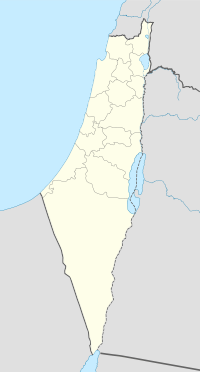Al-Tira (Haifa)
| al-Tira | |
|---|---|
| Arabic | الطيرة |
| Name meaning | The Fortress |
| Also spelled | Tirat al-Lawz |
| Subdistrict | Haifa |
| Coordinates | 32°45′43″N 34°58′31″E / 32.76194°N 34.97528°ECoordinates: 32°45′43″N 34°58′31″E / 32.76194°N 34.97528°E |
| Palestine grid | 148/240 |
| Population | 5,270 (1945) |
| Area | 45,262 dunams |
| Date of depopulation | 16 July 1948 |
| Cause(s) of depopulation | Military assault by Yishuv forces |
| Current localities | HaHotrim,Tirat Carmel,Megadim,Kefar Gallim,Beyt Tzvi |
al-Tira (Arabic: الطيرة, also called Tirat al-Lawz or "Tira of the almonds" to distinguish it from other al-) was a Palestinian town located 7 kilometres south of Haifa.
It was made up of five khirbets, including Khirbat al-Dayr where lie the ruins of St. Brocardus monastery and a cave complex with vaulted tunnels.
The Crusaders called al-Tira, St. Yohan de Tire, and in the thirteenth century the village contained a Greek Orthodox abbey of St. John the Baptist. In 1283 it was mentioned as part of the domain of the Crusaders, according to the hudna between the Crusaders and the Mamluk sultan Qalawun.
In 987 H. (1579 CE) it is recorded that Assaf, the sanjaqbey of Al-Lajjun, built a mosque in the village.
In 1596, al-Tira was a village with a population of 286 under the administrative jurisdiction of the nahiya ("subdistrict") of Shafa, part of Sanjak Lajjun of the Ottoman Empire. It paid taxes on a number of agricultural products, including wheat, goats, beehives, and vineyards,
Victor Guérin visited in 1870, “I first examined a small mosque, which appears to have been formerly a Christian church. Aligned from west to east it has only a single nave and is terminated towards the east by an apse. One enters through a rectangular door crowned by a fine monolithic lintel. This church, which has been constructed with very regular ashlars, is covered by slightly pointed vaults, above which there is a flat terrace roof.”
After the heavy conscription imposed by the Ottomans in 1872, there was a decline in the village's prosperity, but it subsequently recovered.
...
Wikipedia

